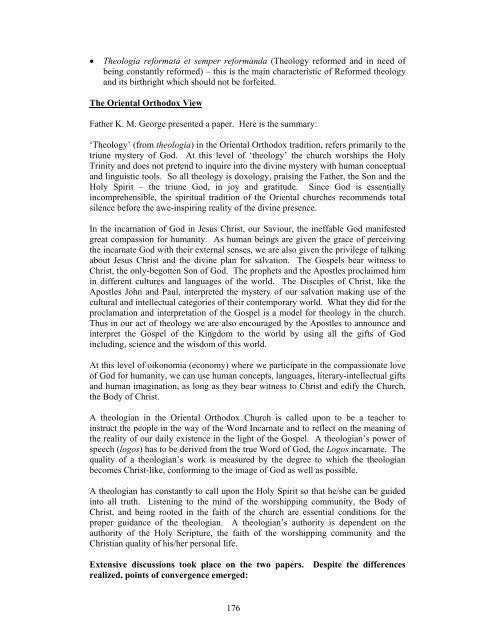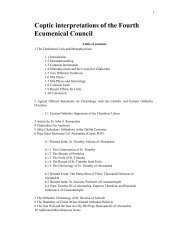Coptic Church & Ecumenical Movement - Saint Mina Coptic ...
Coptic Church & Ecumenical Movement - Saint Mina Coptic ...
Coptic Church & Ecumenical Movement - Saint Mina Coptic ...
Create successful ePaper yourself
Turn your PDF publications into a flip-book with our unique Google optimized e-Paper software.
• Theologia reformata et semper reformanda (Theology reformed and in need of<br />
being constantly reformed) – this is the main characteristic of Reformed theology<br />
and its birthright which should not be forfeited.<br />
The Oriental Orthodox View<br />
Father K. M. George presented a paper. Here is the summary:<br />
‘Theology’ (from theologia) in the Oriental Orthodox tradition, refers primarily to the<br />
triune mystery of God. At this level of ‘theology’ the church worships the Holy<br />
Trinity and does not pretend to inquire into the divine mystery with human conceptual<br />
and linguistic tools. So all theology is doxology, praising the Father, the Son and the<br />
Holy Spirit – the triune God, in joy and gratitude. Since God is essentially<br />
incomprehensible, the spiritual tradition of the Oriental churches recommends total<br />
silence before the awe-inspiring reality of the divine presence.<br />
In the incarnation of God in Jesus Christ, our Saviour, the ineffable God manifested<br />
great compassion for humanity. As human beings are given the grace of perceiving<br />
the incarnate God with their external senses, we are also given the privilege of talking<br />
about Jesus Christ and the divine plan for salvation. The Gospels bear witness to<br />
Christ, the only-begotten Son of God. The prophets and the Apostles proclaimed him<br />
in different cultures and languages of the world. The Disciples of Christ, like the<br />
Apostles John and Paul, interpreted the mystery of our salvation making use of the<br />
cultural and intellectual categories of their contemporary world. What they did for the<br />
proclamation and interpretation of the Gospel is a model for theology in the church.<br />
Thus in our act of theology we are also encouraged by the Apostles to announce and<br />
interpret the Gospel of the Kingdom to the world by using all the gifts of God<br />
including, science and the wisdom of this world.<br />
At this level of oikonomia (economy) where we participate in the compassionate love<br />
of God for humanity, we can use human concepts, languages, literary-intellectual gifts<br />
and human imagination, as long as they bear witness to Christ and edify the <strong>Church</strong>,<br />
the Body of Christ.<br />
A theologian in the Oriental Orthodox <strong>Church</strong> is called upon to be a teacher to<br />
instruct the people in the way of the Word Incarnate and to reflect on the meaning of<br />
the reality of our daily existence in the light of the Gospel. A theologian’s power of<br />
speech (logos) has to be derived from the true Word of God, the Logos incarnate. The<br />
quality of a theologian’s work is measured by the degree to which the theologian<br />
becomes Christ-like, conforming to the image of God as well as possible.<br />
A theologian has constantly to call upon the Holy Spirit so that he/she can be guided<br />
into all truth. Listening to the mind of the worshipping community, the Body of<br />
Christ, and being rooted in the faith of the church are essential conditions for the<br />
proper guidance of the theologian. A theologian’s authority is dependent on the<br />
authority of the Holy Scripture, the faith of the worshipping community and the<br />
Christian quality of his/her personal life.<br />
Extensive discussions took place on the two papers. Despite the differences<br />
realized, points of convergence emerged:<br />
176








